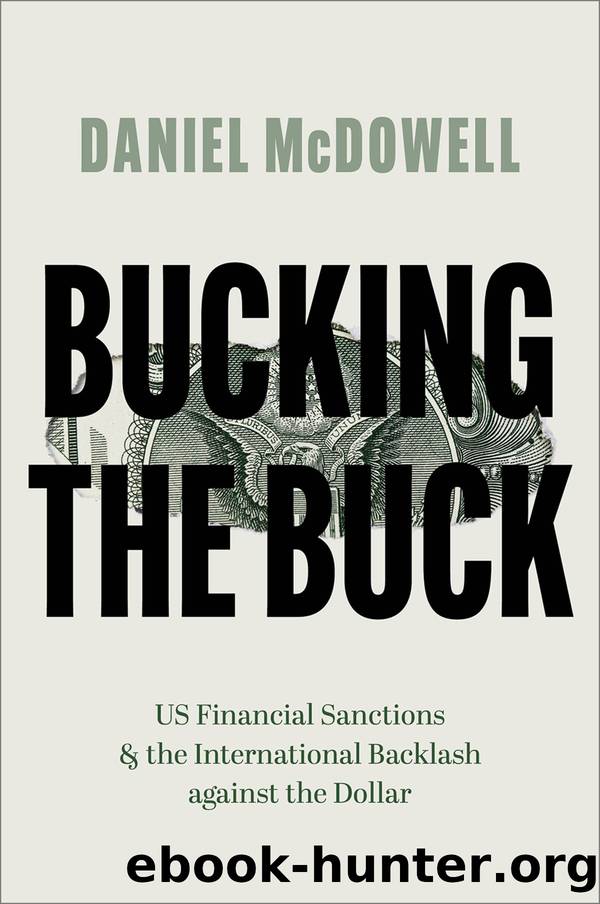Bucking the Buck by Daniel McDowell

Author:Daniel McDowell
Language: eng
Format: epub
Publisher: Oxford University Press
Published: 2023-06-15T00:00:00+00:00
Firm-Level Experiment: US Sanctions and Trade Settlement Preferences
De-dollarization of trade settlement ultimately comes down to decisions made by individual firms. Governments can sign agreements like local currency swap deals that make it easier and more attractive for firms to settle trade in local currencies. Eventually, however, businesses must decide whether to move their cross-border transactions out of the dollar. All else equal, a government that wishes to reduce the role of the dollar in cross-border trade due to political risk concerns will be more likely to succeed if firms in the country are also concerned about dollar dependence. Firm managers who have been awakened to the political risk of relying on the dollar should be more responsive to state-led anti-dollar initiatives than those who have not. The former should be more willing to collaborate with the government and to invest time and resources into changing their payment relationships with foreign partners.
It is thus an important and open question whether firms react to US sanctions with heightened political risk concerns of their own. While US sanctions programs broadly target foreign governments, they often directly target firms. Businesses blacklisted by the US Treasury are cut out of dollar-based payments, causing tremendous harm to their global business relationships. As the United States has increased its use of financial sanctions as a tool of foreign policy, business managersâ attitudes toward the dollar may have shifted. Relying on the dollar for cross-border payments may make sense from a purely economic perspective, but the political risks of doing so may make industry executives more willing to consider currency alternatives. If sanctions generate political risk concerns among firms, then priming business managers to think about the growing use of financial sanctions should boost their interest in using non-dollar currencies for trade settlement as well as their support for initiatives that make such an outcome possible.
To explore whether priming firm managers to think about the US governmentâs increasing use of financial sanctions affects attitudes toward dollar alternatives, I fielded an original survey experiment in Vietnam as part of the 2019 Provincial Competitiveness Index (PCI).32 Multinational corporations (MNCs) from fifty-one countries are represented in the survey of over 1,500 firms operating facilities across fourteen national provinces. Vietnam is a useful case for assessing the impact of US financial sanctions on corporate managersâ attitudes toward the dollar. Vietnam has never been the target of US financial sanctions. This is helpful, since firms in countries that have been targetedâlike Russia, Venezuela, or Iranâwould likely exhibit much higher baseline levels of concern about the dollar. If interest in non-dollar trade settlement is already elevated due to experience with sanctions, this could weaken any potential treatment effect from information about US sanctions. Because Vietnam has no experience with US financial sanctions, it provides a cleaner test of how sanctions impact firm manager attitudes toward dollar payments.
Vietnam is also a useful case because it is currently one of the most important developing economy destinations for investment by MNCs.33 Between 1980 and 2013, it boasted the highest rate of annual growth of net foreign direct investment inflows in East Asia.
Download
This site does not store any files on its server. We only index and link to content provided by other sites. Please contact the content providers to delete copyright contents if any and email us, we'll remove relevant links or contents immediately.
Chaco's Northern Prodigies : Salmon, Aztec, and the Ascendancy of the Middle San Juan Region after AD 1100 by Paul F. Reed(379)
Digital International Relations by Unknown(376)
Law Enforcement Interpersonal Communication and Conflict Management by Brian Douglas Fitch(366)
Skilled interpersonal communication: Research, theory and practice, Fifth edition by Owen Hargie(355)
The Enduring Color Line in U.S. Athletics by Krystal Beamon Chris M. Messer(353)
Critical Perspectives on Human Security : Rethinking Emancipation and Power in International Relations by David Chandler; Nik Hynek(342)
EPSO CAST Political affairs EU policies: How to succeed in the selection procedure by Franco Reverte José María(329)
Evidence-Based Policy Making in Labor Economics by Hamermesh Daniel S.;Nottmeyer Olga K.;Nottmeyer Olga;King Sarah;King Sarah;King Sarah;(319)
Writing Public Policy - A Practical Guide to Communicating in the Policy Making Process by Catherine F. Smith(297)
Criminological Theory in Context by John Martyn Chamberlain(294)
Rothschild and Early Jewish Colonization in Palestine (Geographical Perspectives on the Human Past) by Ran Aaronsohn(292)
Positive Psychology and Spirituality in Counselling and Psychotherapy (Conflict, Ethics, and Spirituality, 12) by unknow(289)
Tibeton Yoga Its Secret Doc by Evans-Wentz(283)
Social Problems, Social Issues, Social Science by James Wright(280)
Threshold Concepts in Women's and Gender Studies by Christie Launius Holly Hassel(279)
Cognitive Development in Infancy and Childhood (Elements in Child Development) by Mary Gauvain(273)
Play in child development and psychotherapy: toward empirically supported practice by Sandra W. Russ(272)
Latin American Politics and Society by Gerardo L. Munck & Juan Pablo Luna(252)
The Arab Spring Abroad: Diaspora Activism against Authoritarian Regimes by Dana M. Moss(234)
